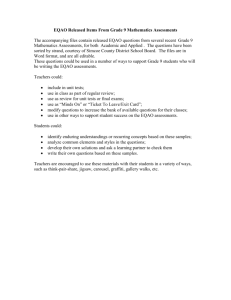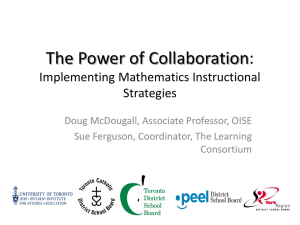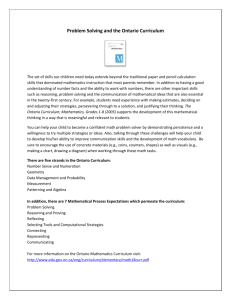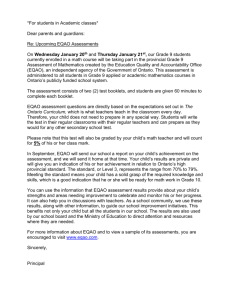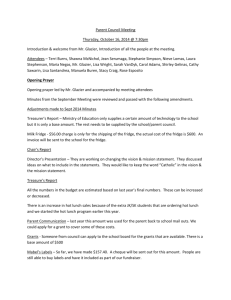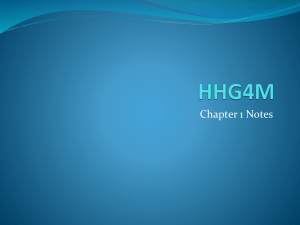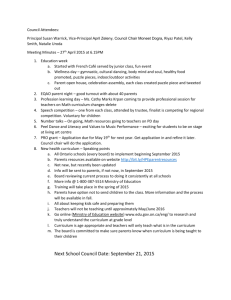Preparing for the Provincial Grade 9 EQAO Math Assessment A
advertisement
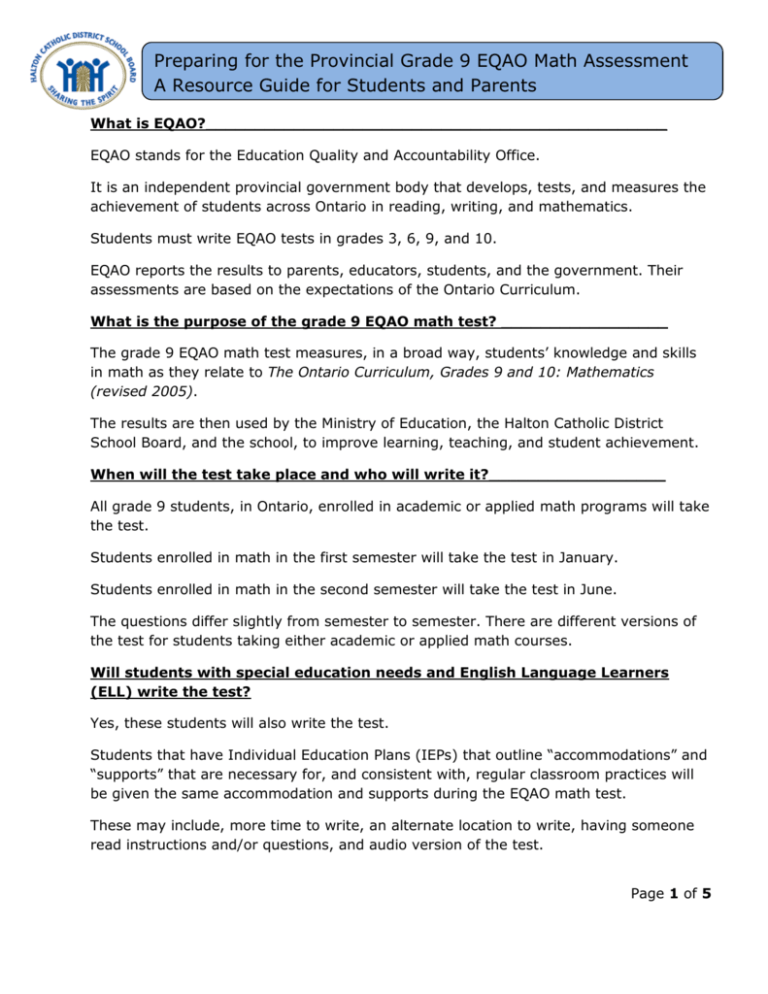
Preparing for the Provincial Grade 9 EQAO Math Assessment A Resource Guide for Students and Parents What is EQAO?_______________________________________________ EQAO stands for the Education Quality and Accountability Office. It is an independent provincial government body that develops, tests, and measures the achievement of students across Ontario in reading, writing, and mathematics. Students must write EQAO tests in grades 3, 6, 9, and 10. EQAO reports the results to parents, educators, students, and the government. Their assessments are based on the expectations of the Ontario Curriculum. What is the purpose of the grade 9 EQAO math test? _________________ The grade 9 EQAO math test measures, in a broad way, students’ knowledge and skills in math as they relate to The Ontario Curriculum, Grades 9 and 10: Mathematics (revised 2005). The results are then used by the Ministry of Education, the Halton Catholic District School Board, and the school, to improve learning, teaching, and student achievement. When will the test take place and who will write it?__________________ All grade 9 students, in Ontario, enrolled in academic or applied math programs will take the test. Students enrolled in math in the first semester will take the test in January. Students enrolled in math in the second semester will take the test in June. The questions differ slightly from semester to semester. There are different versions of the test for students taking either academic or applied math courses. Will students with special education needs and English Language Learners (ELL) write the test? Yes, these students will also write the test. Students that have Individual Education Plans (IEPs) that outline “accommodations” and “supports” that are necessary for, and consistent with, regular classroom practices will be given the same accommodation and supports during the EQAO math test. These may include, more time to write, an alternate location to write, having someone read instructions and/or questions, and audio version of the test. Page 1 of 5 What is the format of the test?___________________________________ Typically, students will complete eight single-part open-response questions and 27 multiple choice questions, each related to a strand and category, through which students will demonstrate achievement of curriculum expectations and mathematical understanding. Multiple Choice questions are scored as correct or incorrect. Students record their answers on a bubble type student answer sheet. Each question has four possible choices with one being the most correct answer. Many of the incorrect answers are based on common students’ misconceptions. Multiple choice account for 46% of the test overall. Open-response questions are scored using a rubric. They allow students the opportunity to demonstrate and apply their knowledge and skills using a multi-step approach in providing a written solution to the problems. Open-response questions account for 54% of the test overall. Students will be given a formula sheet for measurement and 3-D geometry, as well as a list of key words to assist in the development of their answers to the open-response questions. Once the test is complete students will be given 10 minutes to fill out a Student Questionnaire. What strands are covered in the grade 9 math courses?___________________ Grade 9 Academic Number Sense and Algebra Linear Relations Analytic Geometry Measurement and Geometry Grade 9 Applied Number Sense and Algebra Linear Relations Measurement and Geometry What can students do to manage their time while writing the test?__________ Typically, the open-response questions are designed to take about 5 minutes each to answer. Students should spend about 20 minutes on open-response questions . This leaves 30 minutes for multiple-choice. The time spent on each multiple-choice question works out to be roughly 2 minutes. When will students write the test and during which periods?_______________ Check with your school for the exact dates and times of the test. Page 2 of 5 Do the results count as part of the students’ final evaluation in math?____ Schools may decide to mark all or a part of the EQAO math test and include it in the students’ overall math mark. Students may not be made aware in advance which questions will be considered for the final evaluation. Teachers do not see the questions on the test in advance and will not know which questions best reflect their regular classroom assessment practices until after the test has been written. Therefore, it is in the students’ best interest to try their best on all components of the test. Students should answer all the questions on the test. Any unanswered questions are treated as incorrect. How will students and parents find out their results?__________________ EQAO will report the results of the test next fall, for both semesters. Students and parents will receive and “Individual Student Report” which indicates how many questions the student answered in relation to the total number of questions on the test. Unanswered questions are treated as incorrect in the calculation of the students’ result. The student’s overall level of achievement, according to the levels given below is also reported. Level 4 – 80% to 100% or surpasses provincial standard Level 3 – 70% to 79% or provincial standard Level 2 – 60%-69% or approaching provincial standard Level 1- 50% to 59% or much below provincial standard Below level 1 – insufficient achievement of curriculum expectations What material should the student bring to the test?___________________ Students should bring pencils, an eraser, a scientific calculator and a ruler. A highlighter may also be helpful. How can I help my teen prepare for the grade 9 EQAO math test?_______ The grade 9 EQAO math test covers what your teen learns in math class every day. The best way to help your teen prepare for the test is to ensure they complete their math homework on a regular basis. Here are some additional suggestions. Be positive. Page 3 of 5 Be positive about the test and your teen’s final results. Express an interest in your teen’s math work. Offering advice on work and study habits is another way to encourage your teen in a positive way. A positive attitude can have a significant impact on success. Supporting your teen throughout the year is the best thing you can do. Practice with your teen. Visit the EQAO website ( www.eqao.com) , it offers many support materials. Select parent or student resources from the top menu. There are sample tests and solutions. The scoring guide is included for selected open-response questions. The website also includes a “frequently asked questions” section, formula sheets, key words, and sample student report. Note: Your teen may not be able to complete all the questions until they have learned all the topics in their grade 9 math class. Encourage healthy habits. Encourage your teen to get a good night’s sleep and eat a healthy breakfast before school begins on a regular basis. Encourage their communication skills. While a student may have the necessary knowledge and skills to formulate an answer, the challenge lies in communicating their solution effectively. When your teen writes a practice test, go over their answers to the open-response questions together. Look at the amount and quality of what was written. Ask them to explain their answers in more detail. Then help them write a more detailed explanation. Aside from the required calculations, encourage them to use words, diagrams, formulas, graphs, and charts. Tip: Assume the audience (the teacher marking the test) has little to no math knowledge. It is up to the student to convince the reader that they have answered the question completely including as much detail as possible. Contact your teen’s teacher. The teacher will be familiar with the test and provide other resources or ways you can support your teen in math as well as identify particular areas for improvement. Page 4 of 5 Additional school programs. Perhaps your teen’s school offers an after school program to support students in numeracy, math practice work, or sessions designed to help students prepare for the grade 9 EQAO math test. Contact your teen’s teacher or school to find out more. Other Online resources. There are additional resources available to help you and your teen with various math topics as they relate to the Ontario curriculum and the EQAO math test. Homework help homeworkhelp.ilc.org This site is available to students, parents and teachers in our board. This free on-line resource focuses on one-on-one confidential real-time math tutoring for students in Grades 7, 8, 9 and 10. The tutors are certified Ontario math teachers available Sunday to Thursday, 5:30 p.m. to 9:30 p.m. On demand features include Listen & Learn presentations, interactive tutorials and best sessions. Parents are welcome to register on the site as a “guest” to view all the features this site has to offer. HCDSB is one of 15 English-language boards taking part in this pilot project funded by the Ministry of Education in partnership with the Independent Learning Centre. That Quiz www.thatquiz.org This is a free online resource for math practice and testing. Ministry Of Education www.edu.gov.on.ca/eng/curriculum/secondary/math.html This website has the Ontario Curriculum expectations for both grade 9 academic and applied courses. Sources: EQAO and The Ontario Curriculum Grades 9 and 10 Mathematics (2005) Document This resource was created by Catia Cirone, Secondary Numeracy Itinerant Teacher, HCDSB. Page 5 of 5
